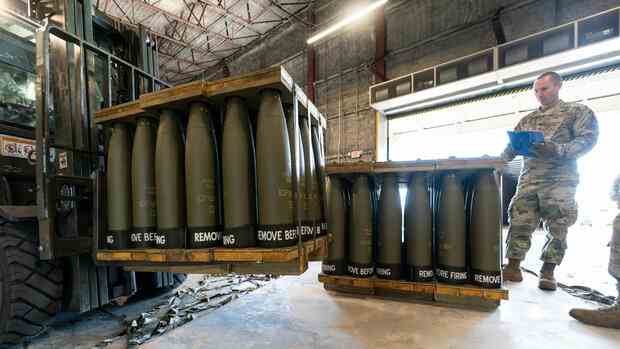For joint ammunition procurement, 25 of the 27 member states have already agreed to order seven different types of 155mm projectiles. The project, which is to be run through the European Defense Agency, is about to start and is set to run for seven years in order to be able to negotiate the largest possible volume discount, as the paper says.
The non-EU country Norway also wants to participate. The European Defense Agency is supposed to negotiate the contracts for the member states and thus become the central institution of the common EU armaments policy.
Billions in aid package planned for Ukraine
At the same time, Borrell and his associates are proposing to further increase the fund that compensates the EU states for arms deliveries to Ukraine. The “European Peace Facility” is to be expanded to include an “extraordinary aid package” worth one billion euros that is “focused on ammunition deliveries”.
In the first year of the war, the EU already financed military aid amounting to 3.6 billion euros in this way. But the ammunition reserves of the member states are slowly being used up.
The Bundeswehr, for example, suffers from a glaring deficiency and would only be able to fight for a few days if it were to defend itself. Army inspector Alfons Mais therefore complained at the Handelsblatt annual conference on security and defense in January that the 100 billion euro special fund for the Bundeswehr had so far not provided any money for ammunition. Around 1.1 billion euros have been reserved for this in the 2023 federal budget.
>> Read here: How the defense industry could do more
The long-term strengthening of the European armaments industry should prevent the EU states from stopping their deliveries to Ukraine out of concern for their own defense capabilities. If “the European defense industry will be able to meet increased long-term needs from both member states and Ukraine,” that should encourage governments “to supply Ukraine with 155 round ammunition without delay,” the Borrell paper said .
Since the defense industry is already stretched to capacity and prices are skyrocketing, “EU industrial policy measures may be necessary to ensure rapid expansion of production capacity.” The EU Commission will examine the arms industry’s supply chains, identify bottlenecks and help set up “new production lines”. Funds from the EU budget could also be used for this.
Ukraine consumes more than Europe produces
NATO Secretary General Jens Stoltenberg recently warned that Ukraine was burning out its ammunition faster than the allies could replace the projectiles. “Ukraine’s current ammunition consumption is several times higher than our current production,” he said.
The US has also repeatedly pointed out the need to increase ammunition production. But little has happened in Europe so far. Germany in particular did hardly anything in the first year of the war to increase armaments production. Not even the gaps created by arms deliveries to Ukraine have been filled.
The new Federal Defense Minister Boris Pistorius vented his anger at an event organized by the SPD parliamentary group this week: the Federal Republic’s armed forces were not capable of defending themselves in the event of a brutal attack.
The war revealed the shortcomings of the European armaments industry. In its operational logic, it would be more like manufactories than modern industrial companies, blaspheme diplomats. As a rule, the arms manufacturers only produced when an order was received, rarely for stock.
However, a reversal is now evident. In his government statement on Thursday, Chancellor Olaf Scholz (SPD) promised the armaments industry “long-term contracts and down payments” so that it can build up production capacities for ammunition and other armaments.
The manufacturer Rheinmetall is already expanding its capacities. Among other things, the company is getting back into the production of ammunition for the Gepard anti-aircraft tank, which is being used successfully in Ukraine. In Hungary, Rheinmetall laid the foundation stone for a new ammunition plant in mid-January, and a separate powder production plant in Saxony is being considered.
More: More than a trillion dollars conceivable – the reconstruction of Ukraine becomes the task of the century
